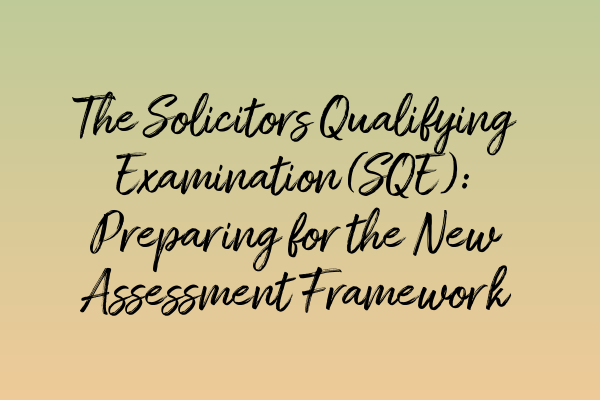Welcome to our blog post on the Solicitors Qualifying Examination (SQE)! As a solicitor, it is essential to stay up to date with the latest changes in the legal profession, and the SQE is one such change that will significantly impact aspiring solicitors. In this post, we will explore the new assessment framework of the SQE and discuss how you can prepare effectively for this crucial examination.
Before we delve into the details, let’s provide a brief background on the SQE. The Solicitors Regulation Authority (SRA) has introduced the SQE to replace the traditional route to qualifying as a solicitor, which includes the Legal Practice Course (LPC). The SQE aims to ensure that all solicitors meet the required standard of competence and provide a more flexible and accessible path to qualification.
Now, let’s discuss the key features of the SQE assessment framework that you need to be aware of:
1. Structure of the SQE
The SQE consists of two stages: SQE1 and SQE2. SQE1 primarily focuses on assessing your functioning legal knowledge, while SQE2 assesses your practical legal skills. The assessment is divided into several modules, each testing specific areas of law.
2. Assessment Methods
The SQE utilizes both multiple-choice questions (MCQs) and practical legal assessments (PLAs) to evaluate your knowledge and skills. MCQs are used in SQE1, while PLAs are conducted in SQE2 to assess your ability to apply legal theory to practical situations.
3. Qualified Lawyers Transfer Scheme (QLTS)
If you are a qualified lawyer from another jurisdiction or have completed the QLTS assessments, you may be exempt from certain aspects of the SQE. However, it is crucial to confirm these exemptions directly with the SRA.
4. Preparing for the SQE
Given the importance of the SQE, it is crucial to prepare thoroughly. Here are some tips to help you effectively prepare for the examination:
- Understand the Assessment Criteria: Familiarize yourself with the assessment criteria and the skills and knowledge areas that will be evaluated in each module of the SQE.
- Form a Study Plan: Create a study plan that allows you to cover all the required topics within the given time frame. Allocate enough time for both theoretical study and practical application.
- Utilize Study Materials: Use reliable study materials, such as textbooks, practice papers, and online resources, to enhance your understanding of the subject matter and practice answering MCQs and PLAs.
- Join Study Groups: Collaborating with fellow aspiring solicitors can provide a valuable platform for discussing complex legal concepts, sharing study resources, and practicing mock assessments.
- Seek Professional Guidance: Consider seeking guidance from experienced solicitors or SQE tutors who can provide practical tips, answer your questions, and help you refine your study approach.
Now that we have covered the essentials of preparing for the SQE, let’s take a moment to explore some related articles that may be of interest to you:
- A Closer Look at the Bar Professional Training Course (BPTC)
- The Role of Technology in Modern Legal Practice
- Financing Your Law Degree: Understanding Costs and Options
- A Look into Prominent Law Firms in the UK
- Staying Ahead: Current Legal Industry Trends in the UK
We hope you found this blog post on preparing for the SQE informative and helpful. Remember, the SQE is a challenging examination that requires dedicated preparation. By understanding the assessment framework and following our tips, you can increase your chances of success. Good luck with your SQE journey, and feel free to contact us if you have any further questions!


Leave a Reply